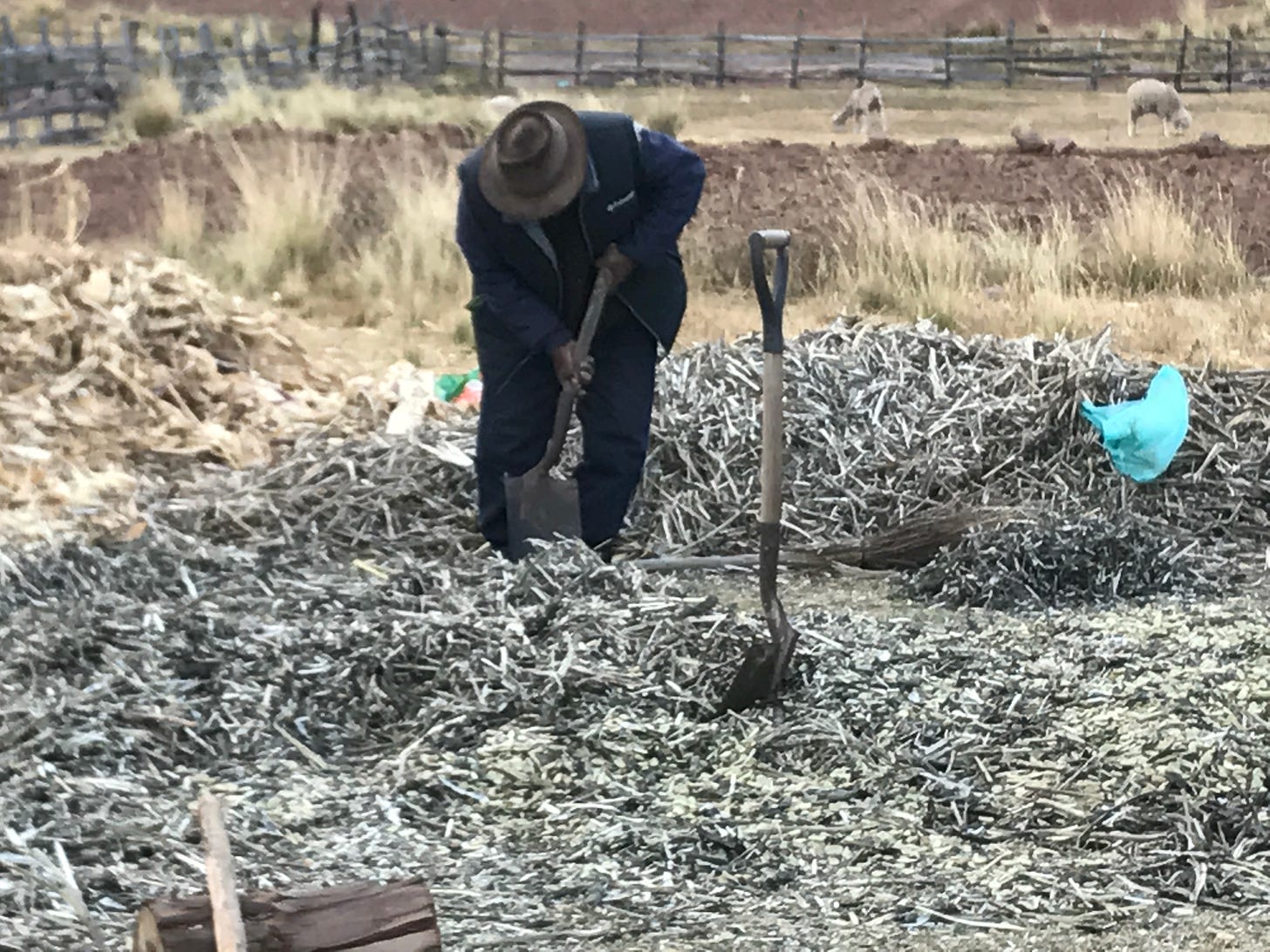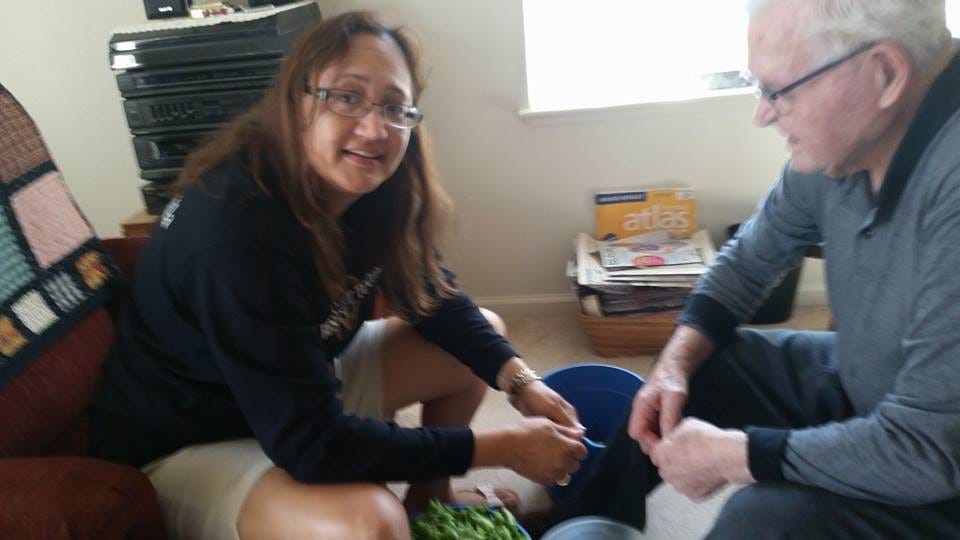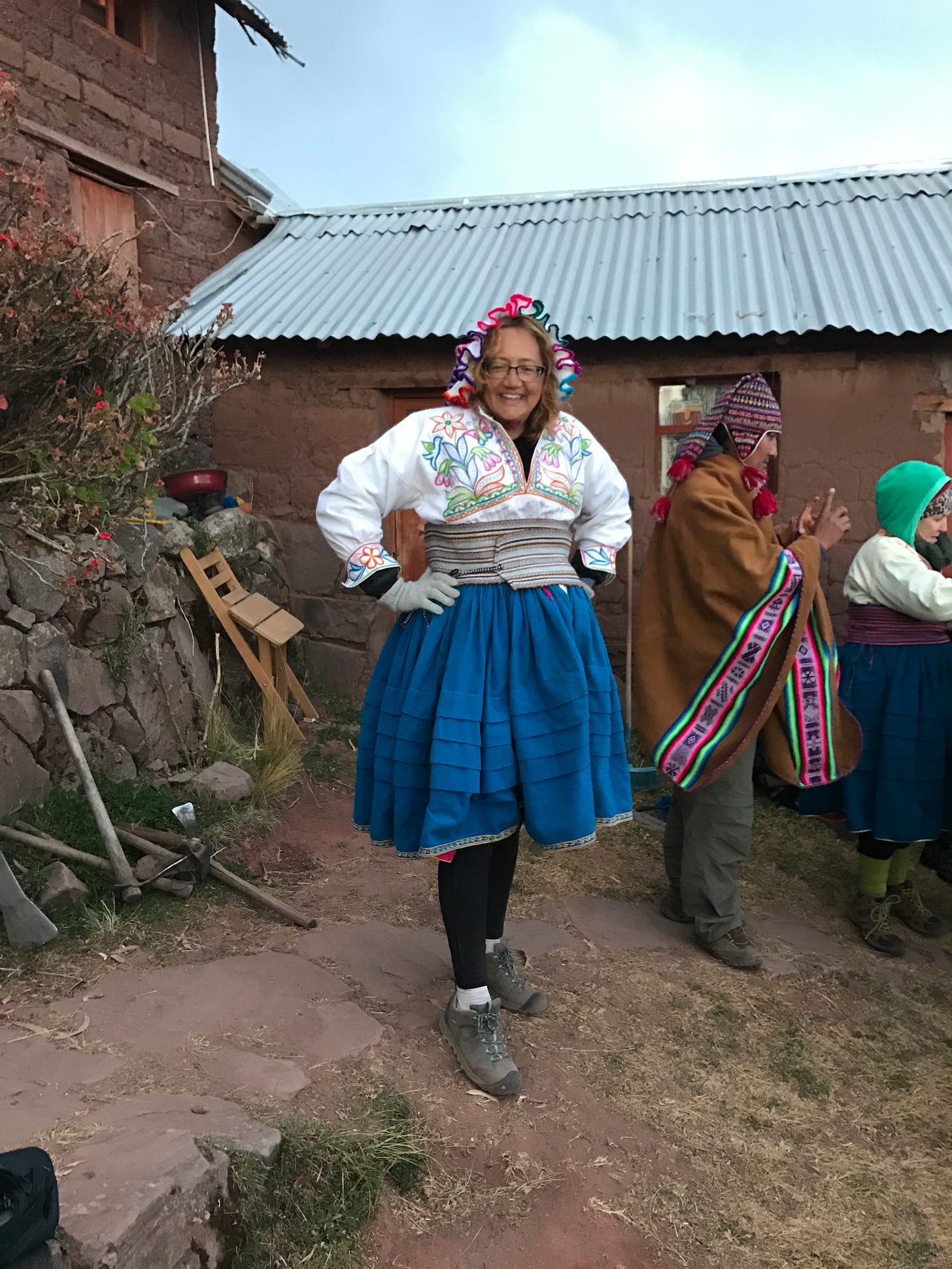There is something about
old men and fava beans.
In a pasture on a hillside
slop above Lake Titicaca,
a flag waves and droops
in an uncertain breeze.
An ancient man, stooped
and bent over, barely bigger
than a child, his face the
blue-red-dark of those
who live on little oxygen
high in the Andes Mountains,
rests on a log in the wintry
afternoon sun. He watches us,
his thoughts inscrutable
as we imitate the motions
of the young woman
dressed in native alpaca
skirt and jacket with
headdress that indicates
her single status.
We tourists are wearing
some of her clothes too.
She shows us how
to insert our shovels
into a pile of mulch
covered beans. We watch
the flag. When the fabric
straightens and snaps in the
burgeoning breeze, we
dig our shovels in and lift
them up, throwing dried
beans into the air.
The beans fall to the earth
with a little clatter like
the rattle of a castanet. But
the chaff lands on our down
jackets, stings our upturned
gaze, catches in our bright
red and white skirts,
tangles in our hair.
Rebellious beans roll
and bounce outside the pile.
Our backs begin to ache.
And then I remember
the other day of the fava beans,
the weekend when I flew up
from Mexico and sat
in my parents’ house,
watching my dad
in his rocking chair,
slippers on his feet.
He sat silent, empty
hands lifting, fingers
stretching out, then
falling back to clasp
his useless knees.
That day when I sat
at the table in my parents’
tiny breakfast nook
watching him out of
the corner of my eye
while I filled out
form after form about
what he could not do.
Could not drive.
could not dress himself.
could not plan meals
for himself. Could not
make decisions for his future.
Did not always know
who everyone was.
And my mother. She sat
in the maroon easy chair
clipping newspapers
for mulch or snapping
the fava beans my brother
had brought from the garden.
Her scissors sheared along
the paper. Neat confetti
rectangles fell into a sack
on the carpet. Then her
paring knife went through
the bean pods, cutting upward.
She pried the pods open, then
tipped the beans neatly into
a metal bucket, all the while
telling me how hard it was
to take care of my dad.
Drinking the Italian coffee
I had brought with me,
I asked questions and observed.
The sun slipped through
the porch windows, firing
the beige carpet to gold,
falling on the dog who didn’t
sit on my dad’s lap anymore.
My dad sat there saying nothing.
More buckets of fava beans
came in, my brother’s bumper
front yard crop. Mom got so tired
she began to cry. I told her to go
lay down and take a nap.
She took herself off to the bedroom.
And then my dad said,
“I’ll finish up these beans.”
I asked him, “You really want to?”
“Yes, I believe I’ll do it,” he said.
I brought the bucket over,
handed him the knife.
But when I saw how
his shaky hands wielded it,
I took the knife away.
No matter, he just efficiently
snapped the pods between
the beans with his fingers
and dumped them into the pail.
This man knows what he’s doing,
I thought.
Sometimes beans hopped
onto the carpet. He got out
of the rocking chair, down
on his knees, picked up
the beans, put them back
in the bucket.
I pulled up a chair and began
to help. We sat as the afternoon
light faded, foreheads together,
knees splayed over the bucket
between us, talking about
the beans. This one was difficult,
that one crazy. One bucket
emptied out, another filled up,
stray beans popped and rolled
on the carpet. He got up
and down from the rocker,
picked them up, placed them
in the bucket.
After an hour I asked
if he wanted to stop. Sweat
rolled off his forehead,
he was breathing hard.
“No,” he said, “I’ll just
finish these up.” And he did.
Back in Peru, it’s cold now,
the tourists tired. The dried
grass has blown into the wind
and on to the cow, who bawled
her complaints about straw
landing in her eyes and nose.
She had to be untied
and moved away from our
helpful ministrations. The pile
of mulch seems just as high
as when we started.
The young girl takes a rake
and creates a circle of pods
and twigs around the pile
of beans still covered on mulch.
She thanks us for our work.
We tell her we have done nothing
but she says, “Remember how
high the pile was when you started.”
I ask the young girl if the old man
is her grandfather. She says yes.
I say my father is ninety-four
and that I have also helped him
shell fava beans. She translates
into Ketchua and her grandfather
speaks, telling us he is ninety-three.
We say mucho gusto and wave.
Then we walk off, happy to
relinquish the back breaking
labor and join a volleyball
game of locals and tourists.
As the sun sinks in the sky,
the temperature dips toward
freezing. We chase the ball,
our lungs struggling for oxygen
in the high altitude, our laughter
ringing against the hills above us.
I look back.
The grandfather has risen.
He has a shovel in his hand.
The wind picks up. He digs
into the pile, throws beans high
into the air. Chaff glitters like
silver confetti in pale blue sky
as he gathers the fava beans
into a perfect, neat pile.
Janell Stube 2017










One of my MANY favorites of yours. I loved reading it again, though I love hearing you read it...
Janell you are wonderful. Please continue writing and letting all of us enjoy. Thank you Sweetheart.